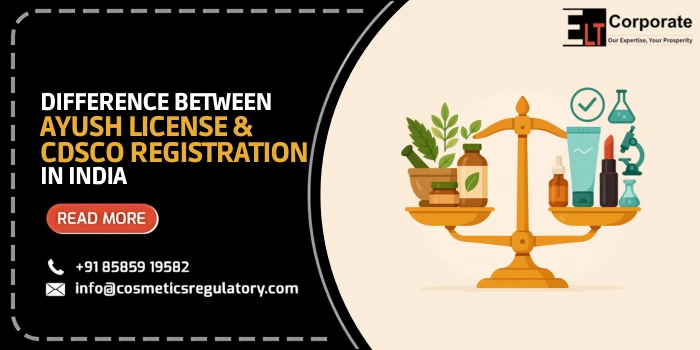The growth of India’s cosmetics industry includes the use of modern and herbal beauty products. Distributors, manufacturers, or importers in the cosmetic industry must understand the compliance frameworks, as this will influence their access to the market. In cosmetics, regulatory approvals, AYUSH License, and CDSCO Registration are of primary importance. While both sectors overlap in the beauty and health segments, they have distinct lines of products that operate under different sets of rules and regulations.
Market understanding differentiates the legal specialists from the other players and innovators in the industry. This article clarifies the distinct differences between the AYUSH License and CDSCO Registration.
What Is AYUSH License?
AYUSH stands for Ayurveda, Yoga, Naturopathy, Unani, Siddha, Homeopathy, and also includes their relevant products/medicines as traditionally defined in Indian systems of medicine. The production of Unani, Siddha, and Homoeopathic medicines is restricted to authorized producers with an AYUSH license.
What Is CDSCO Registration?
The Central Drugs Standard Control Organization (CDSCO) is the national regulatory authority of drugs and cosmetics under the Government of India. Whoever is willing to initiate the manufacture, import, or sale of cosmetics (non-AYUSH synthetic (and/or non-traditional)), that individual must get registered with CDSCO.
Key Differences Between AYUSH License And CDSCO Registration
Here are the key differences between AYUSH License and CDSCO Registration in brief:
| Aspect | AYUSH License | CDSCO Registration |
| Regulatory Body | Ministry of AYUSH | Central Drugs Standard Control Organization (CDSCO) |
| Governing Laws | Ayurvedic, Siddha and Unani Drugs Rules, 1970 | Drugs and Cosmetics Act, 1940 and Cosmetics Rules, 2020 |
| Product Type | Ayurvedic, herbal, traditional medicines, and cosmetics | Synthetic and non-traditional cosmetics |
| Purpose | Manufacturing and marketing of traditional herbal products | Manufacturing, importing, and marketing allopathic cosmetics |
| License Type | Manufacturing and marketing license for Ayurvedic medicines | Import registration certificate or manufacturing license for cosmetics |
| Safety Focus | Based on classical texts, traditional safety and efficacy data | Based on modern scientific testing and regulatory standards |
| Process | Application through the State AYUSH authorities | Application through CDSCO’s online SUGAM portal |
| Labeling Requirements | Traditional ingredient lists and claims | Strict labeling as per BIS and CDSCO guidelines |
Regulatory Bodies Governing AYUSH License & CDSCO Registration
In India, the Ministry of AYUSH and the State Licensing Authorities (SLA) manage AYUSH Licences under the Drugs and Cosmetics Act of 1940. The SLA manages regulatory oversight for Ayurveda, Unani, Siddha, and Homeopathy (collectively termed as AYUSH) products. The SLA also sets some of the quality benchmarks which set the standard monographs for nyush drugs, parallel to the way CDSCO handles allopathic drugs, medical instruments and cosmetics under the Department of Health and Family Welfare. The CDSCO is overseen by the Drug Controller General of India (DCGI), who grants licenses for drugs, supervises clinical trials, and controls the registered imports of the drugs. The CDSCO also has a variety of central and zonal offices that verify compliance with regulations for drugs and drug safety.
When Is An AYUSH License Required?
You must obtain an AYUSH license if your product is an Ayurvedic cosmetic or herbal personal care product that is entirely composed of herbal and traditional components from Ayurveda, Unani, or Siddha systems.
Is It Possible For A Product To Possess Both An Ayush License And CDSCO Registration?
Typically, a product is either under CADSO regulation or AYUSH regulation based on its ingredients and claims. Nevertheless, some blend products incorporate both traditional and modern ingredients, which may require evaluation to establish the suitable license.
FAQs
Do Herbal Cosmetics Require AYUSH and/or CDSCO License?
AYUSH license only if it is manufactured as Ayurvedic/Unani/Siddha medicine, and makes therapeutic claims. CDSCO registration is required for all cosmetics sold or imported to India, whether herbal or not.
Who Issues These Licenses?
AYUSH: Ministry of AYUSH via State Licensing Authority related to the Ayurvedic, Siddha & Unani Drugs Rules. Central Drugs Standard Control Organization/ DCGI via the SUGAM portal under the Drugs & Cosmetics Act and Cosmetic Rules 2020.
How Long Is The Process And Validity?
The process of obtaining AYUSH usually takes 45–90 days & is valid for 5 years. While CDSCO takes 90–120 working days & is valid for 5 years.



